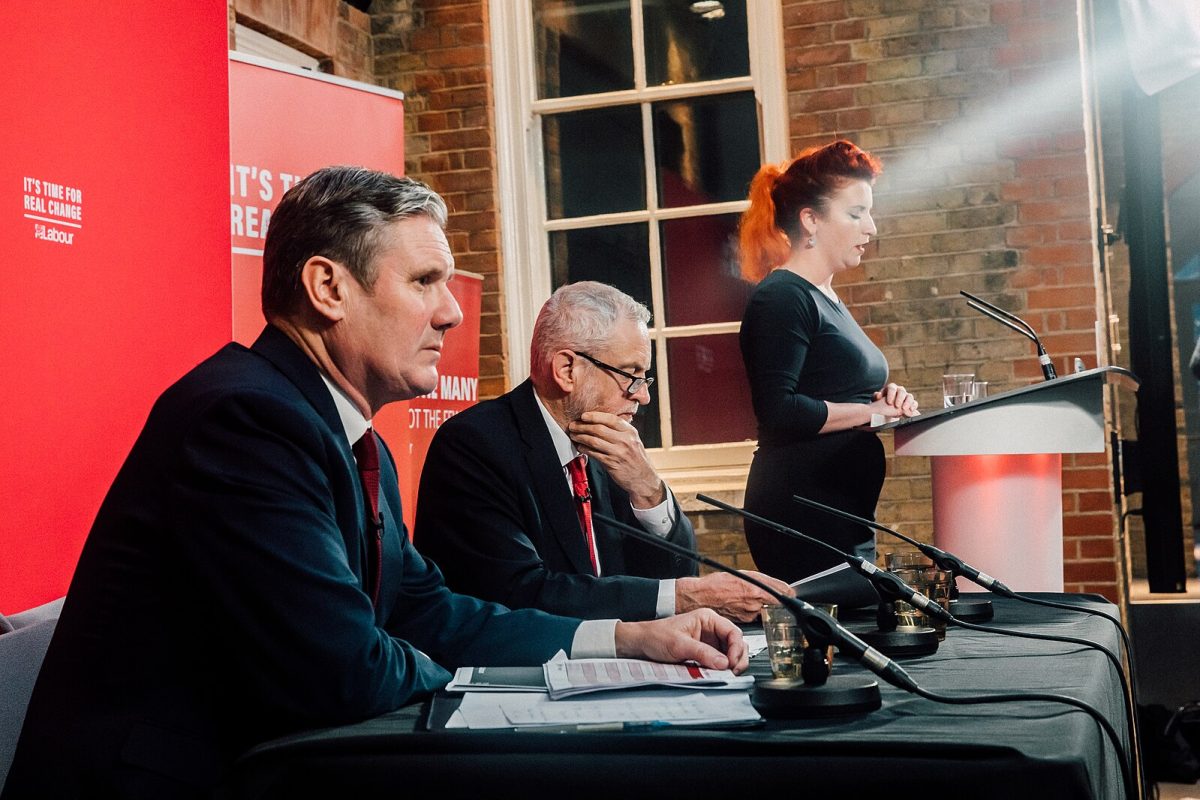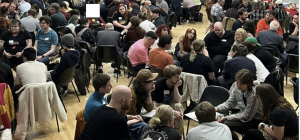
Your Party needs to bury Labourism
Jonny Jones and Jaice Titus •Your Party has sparked a wave of excitement on the left. To succeed it must break with the weight of Labourism, argue Jonny Jones and Jaice Titus, in the first of a two-part series.
On 24 July, after months of ‘will-they-or-won’t-they’ anticipation, Jeremy Corbyn and Zarah Sultana announced the launch of a new left party under the temporary name Your Party. This development couldn’t have come too soon. The Labour Party under Keir Starmer, elected on a wave of anti-Tory revulsion, has upheld the two-child benefit cap, eroded the rights and dignity of migrants, trans and disabled people, and is complicit in the unbearable genocide unfolding in Gaza while repressing activists at home. The need for a principled mass socialist organisation has never been clearer or more urgent.
Within weeks, over 800,000 people had registered their interest in being involved. This enthusiasm has been reflected in dozens of local meetings, usually unofficially organised by the existing left but attracting a mixture of new faces and movement stalwarts. However, at the top of the nascent organisation, things have moved much more slowly. Reports of behind-the-scenes factionalism predated Corbyn and Sultana’s announcement but seem to have intensified since then.
The divisions in Your Party do not neatly map onto stark differences in politics but rather reflect egos and concerns over control and influence. Who should lead? Who should have a say? Who should attend the founding conference? Who should be allowed to join? These manoeuvres stand in stark contrast to the open and democratic politics espoused by both Corbyn and Sultana, and the openness suggested in allowing the membership to choose the party’s name.
In light of this, it is unsurprising that many former allies of Corbyn are defending their position of staying in Labour. Left Labour MP Clive Lewis says that one reason he is staying is that Labour is ‘the political vehicle that has done more than any other to improve the lives of working-class people in Britain’, a position promoted by Momentum, the hollowed-out shell of the organisation that existed primarily to defend Corbyn’s leadership. Andrew Fisher, formerly Corbyn’s Executive Director of Policy, argues that ‘Labour’s affiliation with 11 trade unions has helped force, even in the party’s darker times, some progressive policies onto the statute books.’
In practice, however, the logjam at the top of Your Party has similar roots to this devotion to the Labour Party. While many people are breaking with Labour, it is yet to be seen whether a new left party can break with the underlying politics of Labourism.
What is Labourism?
Ralph Miliband defined Labourism as ‘an ideology of social reform, within the framework of capitalism, with no serious ambition of transcending that framework’. This is a reasonable interpretation of Labourism, but it doesn’t go far enough in unpicking the social bases of such an ideology.
At the 1935 Labour Party conference, Ernest Bevin derided the idea that the Labour Party had been the creation of the socialist MP Keir Hardie, instead declaring it ‘grew out of the bowels of the Trades Union Congress’. Bevin was right. The role of the trade union bureaucracy under capitalism is to mediate between labour and capital. It accepts under most circumstances the authority of the state and orientates on it as the key means of institutionalising gains for the workers’ movement. This social relationship has underpinned the practice of subordinating working-class struggle to parliamentary ‘advance’, allowing Labour leaderships and MPs significant leeway to follow their own paths with little accountability to the party membership or the class and giving rise to the ideology that Miliband identifies: Labourism ‘is not, like Marxism, an ideology of rupture but an ideology of adaptation.’
While the Labour Party has historically represented the political expression of the trade union bureaucracy’s ambitions within the state, Labour’s attempts to articulate a so-called ‘national interest’ often put it on a collision course with sections of the trade union bureaucracy. In the long run, however, the bureaucracy, whether led by the left or the right, tends to give way because it fears jeopardising the position of a Labour government and giving strength to its rivals, and relies on a growing economy to continue to mediate between workers and bosses successfully. This division between the economic goals of the trade unions and the political goals of the Labour Party has played a pernicious role in the working-class movement, from the betrayal of struggles like the Great Miners’ Strike of 1984-85 to the Labour-run Birmingham Council’s use of scab labour to try and break the bin workers’ strike today.
The degree of autonomy that Labour’s leadership has from the union bureaucracy varies over time. The labour movement’s defeats in the 1980s prompted a dramatic shift in the balance of power between the Labour Party leadership and the trade union bureaucracy. By the time Tony Blair’s New Labour came to power, most trade union leaders made themselves content with crumbs from the table of neoliberal economic reforms, even as Blair refused to roll back Tory anti-union laws and reneged on promises to make it easier for unions to achieve recognition in workplaces. There was a partial reassertion of influence under Ed Miliband, though his piecemeal reform of union influence over leadership elections would open the door to Corbyn in 2015. During Corbyn’s leadership, the unions played a contradictory but often conservative role. Sometimes defending Corbyn, but often brokering compromises with the right, such as restraining the leadership over mandatory reselection and backing Heathrow expansion, fracking for gas and the renewal of Trident nuclear weapons.
Starmer attempted to placate union leaders with the promise of a ‘New Deal for Working People’ reform package and above-inflation pay settlement for public sector unions. However, the New Deal reforms have been repeatedly watered down, and with Unite leader Sharon Graham saying it had ‘more holes in it than Swiss cheese.’ Now the government is having to take a tougher stand against union pay claims due to the weak economy and its refusal to tax the rich to fund spending.
Breaking from Labourism
The ideas of Antonio Gramsci give us a useful tool with which to think about the way that an organisation like the Labour Party can play the role of stabilising, rather than challenging, the status quo. His concept of the ‘integral state’ emphasises the ways that political society (the government, permanent bureaucracy, the courts, police and army, etc.) enwraps civil society and dominates it – including the institutions of the labour movement, such as trade unions and political parties. In this view, civil society is not simply the social space of private individuals, associations and non-governmental organisations, but a ‘powerful system of fortresses and earthworks’ that defends the status quo from challenges. The relationship between the Labour Party, the trade union bureaucracy and political society can be seen as one in which working-class discontent can be integrated into the capitalist state.
This can be seen historically at a national scale, such as when the Labour Party steps in as the ‘second team’ of capital to govern when the Tories are exhausted and attempts to establish stability. When the Tories were defeated by the miners’ strikes of 1972 and 1974, it was the Labour Party that stepped in to implement wage controls, with the assistance of the trade union bureaucracy. Tony Blair’s New Labour ensured the essential continuity of neoliberalism after the collapse of John Major’s government, pushing the party to new heights of racism and warmongering with virtually no active opposition from mainstream trade union leaders. Even under Corbyn, the Labour Party became a prison in which policies like ‘more police on the streets’ were the thin end of the wedge for disastrous pledges to run a second referendum on EU membership.
We can also see how political activity within Labour stunted the agency of many socialists at a micro level. In 2017, just before Theresa May called a snap election, one of us was in a local grassroots Labour left group reading Ralph Miliband’s Parliamentary Socialism. The group abandoned the book halfway through to canvas in that year’s election. While we don’t have any regrets on how that campaign unfolded, this moment stands as a metaphor for the experience of many socialists who joined Corbyn’s Labour.
While Corbynism became the vehicle through which socialism seemed possible for many, the reality of operating in the Labour Party was hardly conducive to socialist politics. There were very few spaces in which the left could have meaningful debates and discussions. Party meetings were bureaucratic and sterile, with motions and conversations that felt perfunctory and meaningless – they, after all, had almost no impact on an undemocratic conference that did not bind policy. The Labour Party was geared towards offering an illusion of meaningful political activity between elections, but little more than that. Meanwhile, the Labour right sabotaged and derailed developments with reactionary and undemocratic tactics, eventually breaking the Labour left over the question of a second referendum on Brexit and sewing up the leadership of Starmer.
The significance of the split
It was clear that opposition to Starmer’s rotten politics would emerge, but not that it would take the form of a break from Labour. Many oppositions to the mainstream of Labour have developed within the party. Corbynism is the most recent example, but also Bevanism in the 1950s and Bennism in the 1980s. Even the Communist Party of Great Britain, despite never being allowed to affiliate, had its members join Labour as individuals, with some being elected as MPs.
Labour has experienced several splits from the left, but none have successfully established lasting alternatives. In 1932, the Independent Labour Party disaffiliated from Labour but rapidly declined in membership before disintegrating after the Second World War. The Trotskyist Militant Tendency was expelled in the 1980s after gaining control of Liverpool City Council and leading significant campaigns, but its successor organisations failed to break Labour’s hegemonic position in the long term. The Socialist Alliance, Scottish Socialist Party (SSP) and Respect were the latest serious attempts at a left alternative. The SSP was able to elect six Members of the Scottish Parliament thanks to the high profile of Tommy Sheridan and proportional representation in the Scottish Parliamentary elections, but the organisation split in 2006. The Socialist Alliance briefly united a range of fragmented left groups in England and Wales in the early 2000s, but it foundered on internal divisions. Respect was formed in 2004 by expelled Labour MP George Galloway and the Socialist Workers Party, amongst others, seeking to give political expression to the anti-war movement. It won a parliamentary seat in East London and dozens of councillors before it too collapsed in 2007.
These failures stemmed from a combination of limited resources, a lack of national credibility, overreliance on charismatic individuals and the barriers of Westminster’s first-past-the-post electoral system. However, the primary obstacle to these splits was the enduring loyalty of MPs, trade unionists, activists and workers to Labour. In the absence of an alternative breaking through, Labour could rely on being seen as a ‘lesser evil’ than the Tories to hold up its vote. One reason this state of affairs continued is that working-class people generally want to see their conditions improve but do not think that rapid change under their conscious direction is possible. In some periods of history, this belief has been nurtured by the reforms allowed by capitalist development and imperialism. Yet even in periods with few or no reforms, that perspective does not just wither away; as Tony Cliff put it, ‘Many an idea lingers on long after the disappearance of the material conditions which brought it forth’.
Yet this support has been steadily eroding. Corbyn’s leadership of Labour now looks to have been a brief interregnum in what otherwise looks like a quarter of a century of decline. While Starmer’s Labour won 412 seats in 2024 – around 63 per cent of the total – its share of the vote was just 33.7 per cent. Only the catastrophic collapse of the Tories in 2024 allowed him to enter government. Corbyn had won more than half a million more votes in 2019, and around 3 million more in 2017. A similar picture can be seen from membership figures. Labour Party membership reached a peak of around 1 million in the early 1950s – boosted to 6 million when members of affiliated trade unions and societies were included. It reached 405,000 in 1997 under Tony Blair before plummeting to less than 180,000 under Gordon Brown after a decade of neoliberal reform, war and racism. Again, Corbyn bucked the trend, driving membership to a peak of 532,046 in 2019; it has since fallen to just 309,000.
There are numerous reasons for this decline. The social infrastructure that helped maintain a mass base for the party, like networks of Labour-affiliated activists and trade union reps, or social clubs and affiliated groups, has declined precipitously. Neoliberalism has hollowed out democratic institutions, while defeats for the labour movement and accompanying socio-economic shifts have accelerated social atomisation. The most significant gains for workers achieved under Labour governments are in the distant past. While apologists will point to New Labour initiatives such as Sure Start or shorter hospital waiting lists, these reforms were not resilient. They were based on ephemeral economic growth and onerous ‘public-private partnerships’, and any benefits they provided have been largely swept away since the economic crisis of 2008 opened the door to more than a decade of austerity and attacks on working-class living standards.
Starmer has exacerbated Labour’s decline by taking working-class votes for granted while its electoral sway was diminishing. This breakdown has been accelerated by Labour’s shameful support for Israel’s genocide in Gaza, support which allowed for a historic breakthrough of anti-war independent MPs, including Jeremy Corbyn. There is also a sense that some on the left of the trade union bureaucracy are considering their options. Sharon Graham, the leader of Unite, has raised the spectre of disaffiliation after a vote at the policy conference to reexamine the union’s relationship with Labour. This came just two years after an overwhelming vote to reject disaffiliation. This may well prove to be merely tough talk to win leverage over Starmer, but hundreds of thousands of trade unionists will be looking at a new left party and thinking that it is a better option for their union than Labour. This can create new dynamics that may further drive working-class shifts away from the Labour Party.
A new left party may be breaking with Labour, but it must also break from Labourism. This will involve more than escaping boring meetings and desultory discussions. It will need to abandon the undemocratic structures of Labour and resist incorporation into the status quo; even if it is a status quo that has a veneer of something new and radical. While we want to attract the support of trade unions, it cannot be at the cost of member-led democracy. The days of trade union leaders settling arguments behind closed doors and casting votes ‘representing’ thousands of members must be put behind us, along with the unaccountability of leaders and elected representatives to the party as a whole. If we are to grasp the opportunity to create a principled alternative to Labour, we must construct a genuine and participatory democracy from the grassroots up.
In the second part of this article, we will consider what this democracy might look like, what the relationship between members and elected representatives should be, and how it can encourage the development of new forms of working-class subjectivity: the practical capacity of ordinary people to consciously transform the world around them.







0 comments